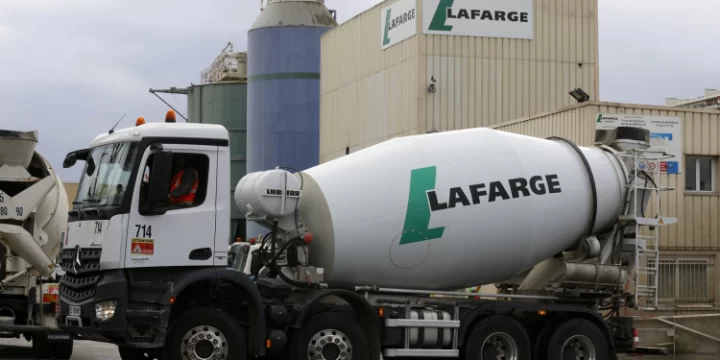Lafarge Africa Plc, in partnership with the Ogun State Government, has embarked on an ambitious environmental sustainability initiative aimed at planting one million trees across the state. The project is designed to combat climate change, restore degraded landscapes, and promote biodiversity, while also creating socio-economic opportunities for local communities.
Speaking at the launch ceremony in Ewekoro, Ogun State, Lafarge Africa’s management emphasised the company’s long-standing commitment to environmental stewardship and sustainable business practices. The cement manufacturer stated that the tree-planting initiative aligns with its broader corporate social responsibility (CSR) framework, which focuses on climate action, community development, and resource efficiency.

According to Lafarge Africa’s Country CEO, the project will span multiple phases over several years, targeting both rural and urban areas. The first phase will prioritise communities most affected by environmental degradation, especially those around the company’s operational sites. Native tree species will be planted to ensure ecological balance, while fast-growing trees will be introduced in areas requiring rapid vegetation cover to prevent erosion.
The Ogun State Government, represented by the Commissioner for Environment, praised the collaboration, describing it as a model for public-private partnerships in addressing environmental challenges. The Commissioner noted that deforestation and land degradation have become pressing issues in the state, driven by urbanisation, industrial expansion, and unsustainable farming practices. He stressed that restoring tree cover is essential not only for environmental health but also for ensuring clean air, water regulation, and enhanced soil fertility.
Environmental experts present at the event highlighted the broader benefits of the initiative, pointing out that large-scale tree planting can play a significant role in mitigating the impacts of climate change by absorbing carbon dioxide and reducing heat in urban areas. They also noted that trees provide habitat for wildlife, reduce noise pollution, and improve overall quality of life.
In addition to environmental benefits, the project is expected to deliver social and economic advantages. Local farmers and youth groups will be engaged in nursery development, planting, and tree maintenance, providing them with income opportunities and valuable skills. Lafarge Africa has committed to providing training and resources to ensure the long-term survival of the planted trees, including irrigation support during dry seasons and protection from grazing animals.
Community leaders welcomed the initiative, acknowledging that tree cover in several areas has declined sharply over the past decade, increasing vulnerability to flooding and soil erosion. They expressed optimism that the programme would restore environmental resilience while improving the aesthetic appeal of their communities.
The launch event also featured educational sessions for schoolchildren, underscoring the importance of environmental conservation from a young age. Lafarge Africa representatives stated that engaging the next generation is key to sustaining the gains of the project over the long term. Educational materials and tree seedlings were distributed to participating schools to encourage student-led greening activities.
This initiative comes at a time when global attention is focused on climate change and the urgent need for collective action. Nigeria, like many countries, is grappling with rising temperatures, erratic rainfall patterns, and other climate-related challenges. The federal government has committed to restoring millions of hectares of degraded land under the African Forest Landscape Restoration Initiative (AFR100), and the Lafarge-Ogun project is expected to complement these national efforts.
Lafarge Africa has been involved in several environmental programmes in Nigeria, including water conservation, waste management, and renewable energy adoption. The company’s decision to invest in large-scale reforestation reflects its understanding that environmental health is integral to long-term economic growth and corporate sustainability.
The Ogun State Government has pledged full support for the project, including land allocation, community mobilisation, and integration of the initiative into its broader environmental policies. Officials said the success of the programme would depend on sustained collaboration between the government, private sector, and local communities.
Monitoring and evaluation mechanisms will be put in place to track progress, survival rates of planted trees, and overall impact. Periodic reports will be shared with stakeholders, and adjustments will be made as needed to ensure the initiative meets its objectives.
The project is expected to inspire similar collaborations in other states, demonstrating that large-scale environmental restoration is achievable when stakeholders pool their resources and expertise. With the combined commitment of Lafarge Africa, the Ogun State Government, and local communities, the one million tree-planting initiative has the potential to make a lasting impact on both the environment and livelihoods in the region.
If successful, the project could serve as a blueprint for integrating environmental restoration with socio-economic empowerment, proving that climate action can also be an engine for development. Stakeholders agree that such initiatives are crucial in building a resilient,greener, and more sustainable future for Nigeria.
Support InfoStride News' Credible Journalism: Only credible journalism can guarantee a fair, accountable and transparent society, including democracy and government. It involves a lot of efforts and money. We need your support. Click here to Donate
